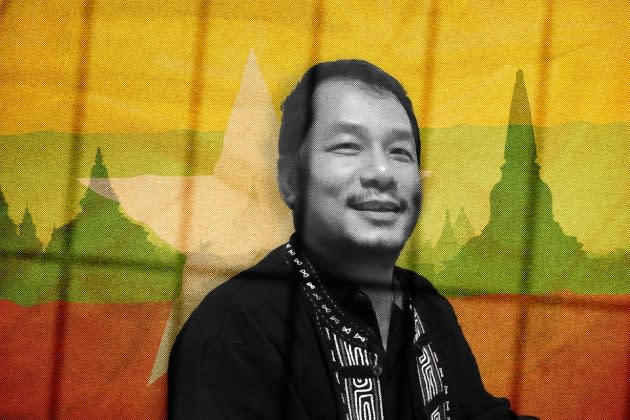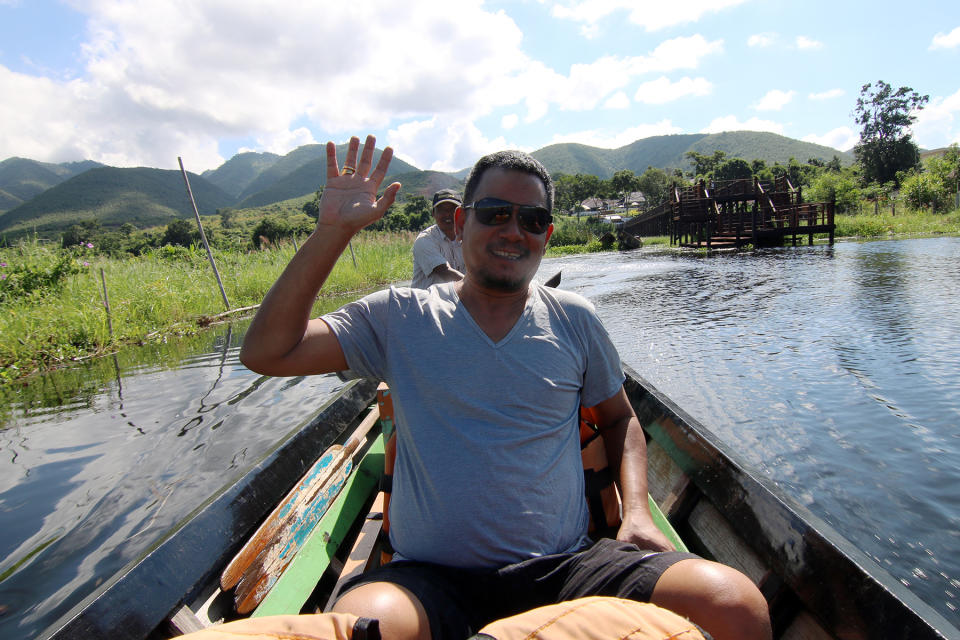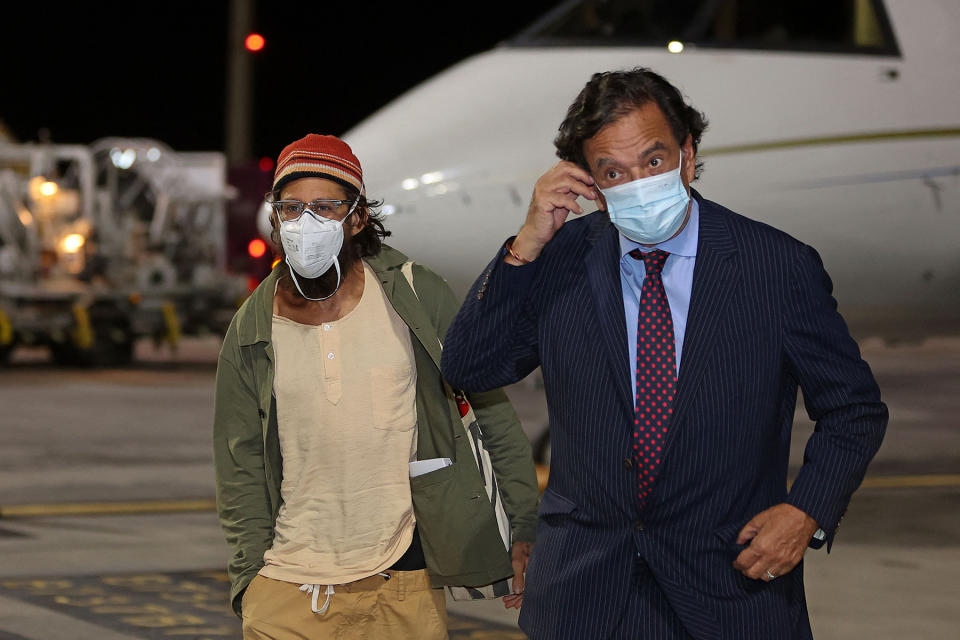Special Report: Family Reveals Plight of U.S. Political Prisoner in Myanmar

When he decided to return to his country of birth, Myanmar, in 2017, Kyaw Htay Oo knew there was a chance he could end up back in prison. No one who grows up in that country has any illusions about its political stability, or where you might land the next time power flips, the next time the jailers become the jailed. But after fourteen years in southern California, where he worked as a botanist and agricultural inspector for Los Angeles County and became a U.S. citizen who loves cars and long California road trips, Kyaw Htay Oo was ready to go back to Myanmar.
Kyaw (pronounced “chaw”) returned to live near some of his extended family on the lush outskirts of Yangon, the country’s largest city, and joined local crews rebuilding after a tropical cyclone had wiped out nearly a hundred homes that spring. From there, he moved to Naypyidaw, the country’s capital, where a new agricultural school welcomed his American-honed expertise. Botany is both his profession and a passion he shared with those closest to him, his brother-in-law David Wolfberg says. In Los Angeles, he had turned his sister’s small front yard into a tropical orchard of mango, papaya, apricot, guava, banana, and citrus trees. From the school in Naypyidaw, his reputation spread, and in 2020, he was hired away to oversee the gardens at the home of Aung San Suu Kyi, the iconic democratic opposition figure, Nobel laureate, and, at the time, the first popularly elected leader in the country’s modern history.
More from Rolling Stone
Myanmar’s brief experiment with democracy—five years of seismic political change and rapid opening to the West—came to an abrupt end on February 1, 2021, with the latest in a series of military coups. Aung San Suu Kyi and several top ministers from her National League for Democracy (NLD) were whisked off to prison cells and political show trials. Though her home was now missing its owner, Kyaw kept at his work in her gardens for another seven months. On calls to his family in Los Angeles at the time, he never mentioned leaving or expressed any worries about being arrested. “He’s not going to just abandon her garden,” Wolfberg tells me. On September 13, 2021, Kyaw’s phone rang with an unusual call from Myanmar’s Ambassador to the United Nations. Though his family can only speculate about the significance of that call, it was the only signal that something was afoot.
Thirty minutes later, federal police arrived and arrested Kyaw on terrorism charges. He’s been in state custody ever since. This made him one of the 65 or more American citizens held by adversarial regimes around the world.
For Kyaw’s family, this must have felt distinctly like history repeating itself. Kyaw had been here before. In 1988, he was a 21-year-old student activist, one of thousands who filled the streets of Myanmar to protest the country’s repressive military rulers. He was arrested several times and did five stints in prison, a common formative experience in what would become known as Myanmar’s “88 Generation.” But last winter, Kyaw was no longer a student protester. He was a 50-year-old botanist with a California pension and, like Aung Saan Su Kyi herself, a political prisoner all over again. In early May, the military courts in Myanmar delivered their verdict: for his alleged crimes against the state, Kyaw was sentenced to seven years in prison.
On January 18, 2022, the U.S. State Department informed Kyaw’s siblings in Los Angeles that he had been formally declared a “wrongful detainee,” a technical distinction that shifted U.S. policy on his case to focus efforts on his recovery. His file would now be handled by the Special Presidential Envoy for Hostage Affairs (SPEHA), a State Department office formed at the end of the Obama Administration in response to the sensational murders of American hostages by ISIS in 2014 and 2015. With the wrongful detainee status thus conferred, Kyaw’s family had fresh hope that the Biden Administration was on top of things and that a plan was in place to bring their brother home.
I learned about Kyaw’s detainment in a conversation last week with Wolfberg, who is married to Kyaw’s youngest sister. A year after Kyaw’s arrest, and nine months since the last substantive update from the administration, the family decided to break their silence and bring awareness to a case that they fear is mired in federal bureaucracy and a system that critics say leaves families of political prisoners feeling abandoned or worse.
“The last conversation I had with him, he was free,” Wolfberg says. “I miss my brother. And his sister misses him. We just want him home.”

Today, there are more American civilians locked away in foreign prison cells than ever before. From Moscow to Tehran, Caracas to Damascus, the crisis spreads faster than any recent White House has been able to keep up with. Whether it’s the rare case that tops global headlines, like WNBA all-star Brittney Griner’s seven-month detention in Russia, or one of the 64 other less famous Americans like Kyaw Htay Oo in Myanmar, there is a common thread that runs through them all: the U.S. government’s inability to plan or implement consistent policies or strategies to bring them home.
This week in Washington, D.C., the James W. Foley Legacy Foundation released its annual report on U.S. hostage policy and family engagement. The Foley Foundation, which was founded by the slain journalist’s family after his 2014 beheading by ISIS militants in Syria, has become the center of gravity in what’s colloquially known as the “hostage enterprise,” the community of families, advocates, and officials that pressure one White House after another to adapt to the worsening reality.
The trend is clear. Over the last ten years, the number of wrongfully detained Americans has exploded, an increase of 580 percent compared to the prior decade. According to the Foley Foundation, nearly half of them have been jailed for more than four years, with average durations increasing by 60 percent. While every administration argues that negotiating with autocratic regimes only empowers them and incentivizes more arrests and detentions, the Foley Foundation shows how current policies are having the same result. In the four years following 9/11, just four countries were detaining U.S. nationals on wrongful grounds. Today, 19 countries are holding Americans in prisons.
Following the manifold tragedies of Foley and the other ISIS hostages, the government tried to address the problem. The Obama administration created the SPEHA office at the State Department and a “hostage recovery cell” led by the FBI. In 2020, congress passed the Robert Levinson Hostage Recovery and Hostage-Taking Accountability Act. Named after the F.B.I. agent held in Iran for more than a decade and presumed dead since 2020, the act enshrined in law many of the policies set out by Obama’s earlier directive. This past July, President Biden issued an Executive Order to further elevate and prioritize wrongful detention cases. But none of these actions have slowed the growing crisis. As the Foley Foundation puts it, “extensive bureaucratic processes, a lack of prioritization, and prolonged decision making” remain huge obstacles to bringing people home.
Last month in Los Angeles, Kyaw’s family received a personalized letter from Secretary of State Antony Blinken reassuring them that their case was being handled at the highest levels of the government. At the bottom of the typewritten letter, Blinken added a handwritten note: “I am with you and determined to bring Kyaw Htay Oo home.”
The family appreciated the outreach, Wolfberg, tells me. But as they watched the first anniversary of their brother’s arrest come and go, they are still waiting to learn what is being done in Washington. “All of this stuff is out of my hands, but it’s hard to land on that one-year mark and not feel like I failed my brother,” Wolfberg says, his voice cracking with emotion. The family doesn’t expect detailed briefings, but they would like to know that something is in the works, that someone has a plan. These no longer seem like safe assumptions.
“It looks to me like there isn’t a plan,” Wolfberg says. “I’m not being assured that there is a plan. It’s been a year. How long does it take to put a plan together?”
When I ask the State Department these same questions, they respond with fuzzy evasions, such as, “We are closely monitoring Kyaw Htay Oo’s situation and continue to press Burma’s military regime to release him immediately. We will do so until he returns home safely to the United States.” (The U.S. government sometimes refers to the country as Burma, using its former name under British colonial rule.)
What’s most interesting about the handling of Kyaw’s case is not what’s said in these boilerplate statements, but what’s left out. After all, the Biden Administration has not only been in this situation before, with an American citizen facing years in a Yangon prison and a family growing increasingly agitated about recovering him, but the White House was in this familiar scene less than a year ago.
On November 15 of last year, former-New Mexico Governor Bill Richardson pulled off a diplomatic stunner when he landed in Doha, Qatar, and emerged from a private jet with a frail and shaggy-haired Danny Fenster, the 37-year-old American journalist who had been held in a Yangon prison for six months and sentenced days earlier to an eleven-year sentence. Richardson has had success plucking unlucky Americans out of messy situations in Iran, Iraq, Sudan, Colombia, and North Korea since the early 1990s. With Fenster, Richardson added Myanmar’s General Min Aung Hlang to the list of despots and dictators he has persuaded to do the right thing.

The final extraction mission, where Richardson and his foundation’s Executive Director Mickey Bergman were on the ground in Myanmar for just eight hours, was the culmination of months of planning and the direct result of preliminary meetings Richardson attended with leaders of the military junta two weeks earlier. For his willingness to give a photo-op to the men behind the February coup, Richardson was publicly slammed in the New York Times and privately cajoled by officials at the State Department to give up his attempts to recover Fenster. When they landed together at J.F.K., however, the Biden administration applauded the win and sent the SPEHA, Ambassador Roger Carstens, to welcome them back.
“Thank you to Governor Richardson for securing the release of Danny Fenster,” Carstens said at the airport. “Sometimes it takes an unconventional approach, and it can’t be the government.”
To many hostage families, and Kyaw’s in particular, Richardson’s success in Myanmar last fall was a ray of hope in the darkness. But to the U.S. government, such “fringe diplomacy,” as Richardson calls it, is a problem. It’s such a problem, in fact, that when I ask the White House this week whether it is working with the Richardson Center, as Blinken said the State Department was, a senior administration official offers the following: “We always want to understand what private, non-governmental actors are doing to enhance our understanding, but of course those efforts are distinct from governmental efforts, such as those that secured the release of Danny Fenster from Burma earlier in this administration.”
Confused by this quote, I call back the White House spokesperson who provided it to confirm that it was not in error and that it means what it says. The spokesperson confirms the quote and reiterates its meaning: “The government secured Fenster’s release,” she tells me.
In other words, according to the Biden White House, the footage of Richardson and Fenster landing in Doha, along with the statements from Carstens in New York and from Fenster himself, all crediting Richardson with his recovery, are all false.
For its part, the Richardson Center is staying above the fray. Bergman tells me that their work with Kyaw’s family continues and that neither he nor Governor Richardson will publicly discuss their working relationship with the U.S. government. “Obviously,” Bergman says, “we all do better when we coordinate closely. After all, we have the common objective of getting these prisoners home to their families.”
In Los Angeles, Kyaw’s sister and her American husband are done being silent. They know their brother, know the charges against him are purely political, and are ready to get him home, regardless of who wants the credit. Prior to taking the job as Aung San Suu Kyi’s groundskeeper, Kyaw asked Wolfberg to send him a library of 120,000 vegetable and herb seeds. He had work to do in Myanmar, life to create and nurture. He wasn’t thinking about politics, Wolfberg says. He was thinking about the future. “Political instability is normal for Myanmar and danger could always be on the horizon,” Wolfberg tells me. Kyaw strives to live the Buddhist way, in freedom from fear, he says. “It’s the only way to survive and thrive.”
Michael Ames is an investigative journalist and co-author of “American Cipher: Bowe Bergdahl and the U.S. Tragedy in Afghanistan.”
Best of Rolling Stone

 Yahoo Movies
Yahoo Movies 